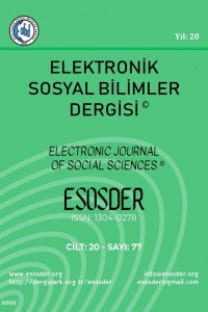ESTABLISHMENT OF THE BRITISH PROTECTORATE IN NORTHERN MESOPOTAMIA DURING THE END OF WORLD WAR I /THE GREAT WAR
İngiltere, Kürdistan, Musul vilayeti, Irak, Türkiye
ESTABLISHMENT OF THE BRITISH PROTECTORATE IN NORTHERN MESOPOTAMIA DURING THE END OF WORLD WAR I /THE GREAT WAR
Britain, Kurdistan, Mosul vilayet, Iraq, Turkey.,
___
- Monographies Al-Jumaily, Qassam, Irak ve Kemalizm Hareketi (1919–1923). Ankara: Atatürk Araştırma Merkezi 19
- Bell, Florance (ed.), The Letters of Gertrude Bell, II. London: Ernest Benn, 1927.
- Bell, Gertrude L., The Arab of Mesopotamia, Basra, 1917.
- Busch, Briton C., Britain, India and the Arabs (1914–1921). Los Angeles: University of California Press, 1971.
- Busch, Briton C., Mudros to Lausanne: Britain’s Frontier in West Asia, 1918-1923. Albany: State University of New York Press, 1976.
- Eagleton, Clyde, International Government. New York: The Ranold Press, 1957.
- Edmonds, Cecil J., Kurds, Turks and Arabs: Politics, Travel and Research in North-Eastern Iraq 1919-1925. London: Oxford University Press, 1957.
- Foster, Henry A., The Making of Modern Iraq: A Product of World Forces. London, Williams and Norgate, 1936.
- Hay, William R., Two Years in Kurdistan, Experiences of a Political Officer, 1918–1920. London: Sedgwick and Jackson, 1921.
- Helmreich, Paul C., From Paris to Sevres: The Partition of the Ottoman Empire at the Peace Conference of 1919–1920. Columbus: Ohio State University Press, 1974.
- Howard, Harry N., The Partition of Turkey: A Diplomatic History 1913–1923. New York: Howard Fertig, 1966.
- Hurewitz, Jacob C., Diplomacy in the Near and Middle East: A Documentary Record 1914–1956, II. New York: D. Van Nostrand, 1958.
- Kedourie, Elie, England and the Middle East. The Vital Years: 1914–1921. London: Bowes and Bowes, 1956.
- Longrigg, Stephen H., Iraq 1900 to 1950: A Political, Social and Economic History. Beirut: Oxford University Press, 1968.
- McDowall, David, A Modern History of the Kurds. London: I. B. Tauris, 1997. Report by Undén, 14 Dec. 1925 in UKNA, PRO 30/52/104, C. 821, 1925-VII; Memorandum on administration of Kurdish districts in Irak, by Bernard H. Bourdillon and Abdul’Muhsin-al-Sa’dun, 24 Feb. 1926 in UKNA, PRO, FO 371/11458.
- Nevakivi, Jukka, Britain, France and the Arab Middle East 1914-1920. London: Athone Press, 1963.
- New Age, xxxii (1923), 213–14.
- Saral, Ahmet H., Türk İstiklâl Harbi, Güney Cephesi, IV. Ankara: Genelkurmay Başkanlığı Harp Tarihi Dairesi, 1966.
- Sluglett, Peter, Britain and Iraq, 1914–1932. London: Ithaca Press, 1976.
- Smuts, Jan C., The League of Nations: A Practical Suggestion. London: Hodder and Stoughton, 1918. Stivers, William, Supremacy of Oil: Iraq, Turkey and the Anglo-American World Order, 1918–1930. London: Cornell University Press, 1982.
- Toynbee, Arnold J., Survey of International Affairs, 1925, The Islamic World, I. London: Humphrey Milford, 1927.
- Wilson, Arnold T., Mesopotamia, 1917–1920: A Clash of Loyalties. A Personal and Historical Record. London: Oxford University Press, 1931.
- Official Publications Documents on British Foreign Policy, 1919–1939, I/II. London: His Majesty’s Stationary Office, 19
- Documents on British Foreign Policy, 1919-1939, I/IV. London: Her Majesty’s Stationary Office, 19
- Documents on British Foreign Policy, 1919–1939, I/VIII. London: Her Majesty’s Stationary Office, 19
- Great Britain, Colonial Office, Report on Iraq Administration, October 1920 to March 1922. London: His Majesty’s Stationary Office, 1922.
- Great Britain, Colonial Office, Report on Iraq Administration, April 1922 to March 1923. London: His Majesty’s Stationary Office, 1923.
- Lozan Telgrafları – Türk Diplomatik Belgelerinde Lozan Barış Konferansı, Şubat-Ağustos 1923, II. Ankara: Türk Tarih Kurumu, 1990.
- Review of the civil administration of Mesopotamia compiled by Miss Gertrude L. Bell for the acting civil commissioner, Parliamentary Papers, Cmd. 1061 (1920).
- Türkiye Büyük Millet Meclisi Gizli Celse Zabıtları, (Turkish National Assembly minutes of the secret sessions), I. Ankara: Türkiye Büyük Millet Meclisi Basımevi, 1980. Archival Materials
- Başbakanlık Osmanlı Arşivi (Prime-ministry Ottoman Archives), Dâhiliye Nezâreti Kalem-i Mahsusu (Interior Ministry Secretariat), 50-3/25, 53-3/65. British Library, India Office Records, Political and Secret Department Records 1756-c1950, 10/781, 10/782, 10/818.
- Dār al-Kutub wa al-Wathā'iq al-'Irāqiyyah (Iraq National Library and Archives), 808-t/4/1, 208S.65/16/6. United Kingdom National Archives, Public Record Office, Air Force Papers, 20/512, 20/513. United Kingdom National Archives, Public Record Office, Cabinet Office Papers, 27/1, 27/24. United Kingdom National Archives, Public Record Office, Foreign Office Papers, 371/3384, 3385, 3407, 4149, 4156, 4161, 4191, 4192, 4193, 5048, 5068, 5069, 5227, 5228, 5229, 5230, 5231, 5232, 6346, 6347, 7772, 7781, 9004, 9009, 10824, 11458.
- United Kingdom National Archives, Public Record Office, Foreign Office Papers, 608/95/365. United Kingdom National Archives, Public Record Office, Foreign Office Papers, PRO 30/52/104.
- ISSN: 1304-0278
- Yayın Aralığı: Yılda 4 Sayı
- Başlangıç: 2002
- Yayıncı: Cahit AYDEMİR
İbrahim Hakan KARATAŞ, Ömer Faruk SÖZCÜ
ÇAPAKÇÛR KÖPRÜSÜ GEÇİŞ MUKATAASI ÜZERİNE BAZI TESPİTLER
ÖĞRENCİ DEVAMSIZLIKLARININ EĞİTİM DENETMENLERİNİN GÖRÜŞLERİNE GÖRE DEĞERLENDİRİLMESİ
Mehmet Nuri GÖMLEKSİZ, Faysal ÖZDAŞ
KOBİ'LERDE ARAŞTIRMA VE GELİŞTİRMENİN VERİMLİLİĞE ETKİSİ VE BİR ARAŞTIRMA
XVI. YÜZYILIN İKİNCİ YARISINDA HALEP'TE BOŞANMA DAVALARI VE MEHİR
SINIF ÖĞRETMENLİĞİ LİSANS PROGRAMININ MEB ÖZEL ALAN ÖĞRETMEN YETERLİKLERİ AÇISINDAN İNCELENMESİ
